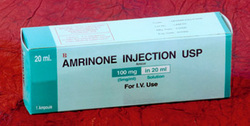Pharmacology definition - Phosphodiesterase Inhibitor

Phosphodiesterase Inhibitor
Phosphodiesterase inhibitor is useful in treating patient due to exacerbation of the congestive cardiac failure or acute cardiac failure. However, the phosphodiesterase inhibitor may carries its own side effects such as cardiac arrhythmias, nausea, vomiting and thrombocytopenia.
Phosphodiesterase inhibitor such as amrinone or milrinone will inhibit and block the action of phosphodiesterase/ phosphodiesterase isozyme III which present on the vascular smooth muscle and cardiac muscle. The action of phosphodiesterase inhibitor may lead to an increase in the level of cAMP and opening of the calcium channel on the surface of the cell. There will be an increase the contraction of the muscle due to the inflow of calcium ions.
Phosphodiesterase inhibitor is useful in treating patient due to exacerbation of the congestive cardiac failure or acute cardiac failure. However, the phosphodiesterase inhibitor may carries its own side effects such as cardiac arrhythmias, nausea, vomiting and thrombocytopenia.
Phosphodiesterase inhibitor such as amrinone or milrinone will inhibit and block the action of phosphodiesterase/ phosphodiesterase isozyme III which present on the vascular smooth muscle and cardiac muscle. The action of phosphodiesterase inhibitor may lead to an increase in the level of cAMP and opening of the calcium channel on the surface of the cell. There will be an increase the contraction of the muscle due to the inflow of calcium ions.
